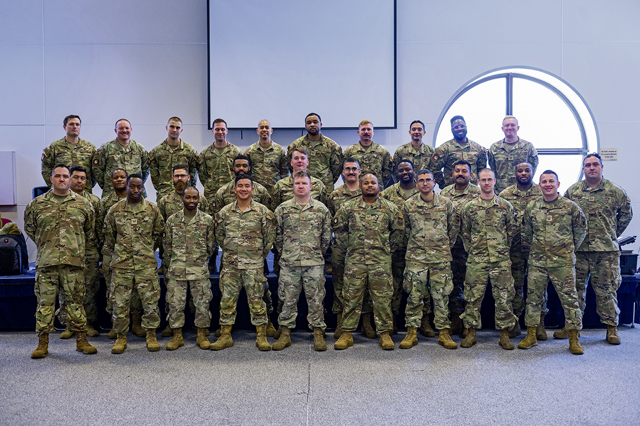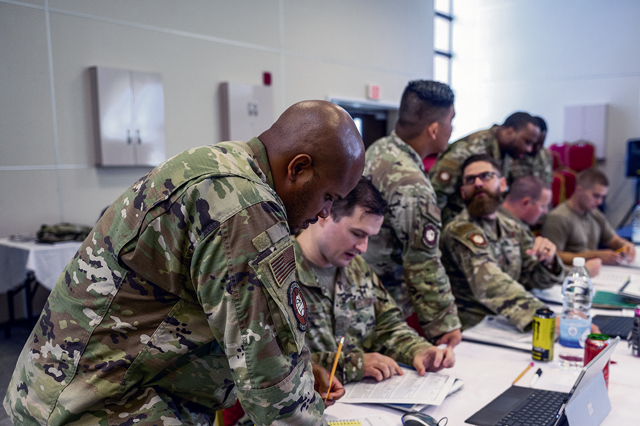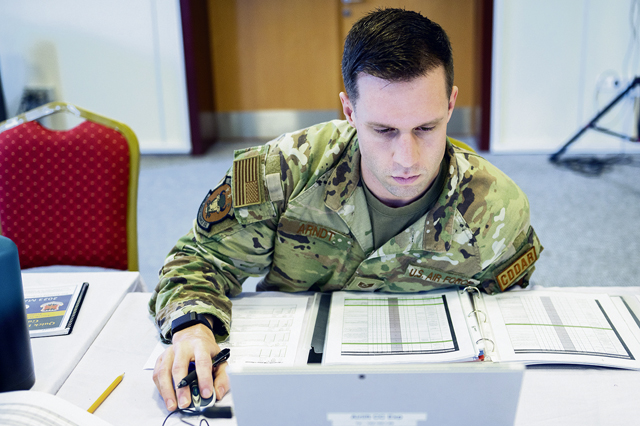
For the first time ever, members of the 728th Air Mobility Squadron were able to accomplish the Maintenance Supervision and Production Course in-house, saving over $220,000 in transportation costs. Twenty-one new production supervisors from the 728th AMS, a tenant unit at Incirlik Air Base, Türkiye, were also joined by students from their host installation partners, the 39th Maintenance Squadron, Aug. 16-21.
When Master Sgt. Roscoe Tamondong, 728th AMS lead production superintendent, first arrived at the unit, he noticed that they had been making do without certified MSPC supervisors.
“Expediters, section chiefs, NCOICs… all maintenance leaders are encouraged to attend,” said Tamondong. “The return on investment is profound as this formal education prepares them for their entire maintenance centric career.”

The MSPC is traditionally offered at the U.S. Air Force Expeditionary Operations School in New Jersey and each iteration only has a limited number of seats allocated per unit, making it both costly and difficult to send rising supervisors. To mitigate this, Tamondong decided to reach out to the schoolhouse and ask about the possibility of a mobile course.
“There was hesitation at first [to see] if we could supply the student count, and if the facilities were adequate, but we effectively answered the tasker. Upon execution, we have been able to prove that the first ever remote mobile course here at Incirlik is the ‘maneuver’”.
The MSPC is mandatory within one year of assuming “Pro Super” responsibilities. As the name suggests, the course focuses on two major areas: production and supervision. The production section consists of curriculum on aircraft maintenance, documentation, estimated times of completion, inspections, parking plans, and statuses. The supervision section centers on training management, personnel management, and expeditionary planning.

Tech. Sgt. Bradley Vaillancourt, 728th AMS C-5 Galaxy aircraft NCO-in-charge and course graduate, explained the value of the curriculum.
“It provides newly appointed maintenance leaders the fundamental knowledge of how to manage the flightline technicians when performing aircraft maintenance, managing supply logistics, updating aircraft status, and aircraft impoundment procedures.”
The seven-day course was led by instructors from the 423rd Training Squadron, who broke up the training into periods of in-classroom instruction, a teleconference with Headquarters Air Mobility Command A4 Staff, a simulated capstone and end of course test.
For the capstone, course instructors used an Aircraft Maintenance Production Simulator to create a digital flight line with multiple C-17 Globemaster III aircraft and KC-135 Stratotankers that had to meet proper maintenance and manpower requirements in austere conditions before being released for flight operations in the face of an incoming hurricane. This complex scenario gave participants a realistic understanding of what aircraft production management and expeditionary planning would look like in a contingency as they transition from technicians to supervisors.
“The scenario the MSPC instructors presented us was an interactive flightline that ran us through scenarios that could potentially delay aircraft departure, such as red-balls or in-flight emergencies, said Vaillancourt. “It was on the production teams to try and utilize resources available to us and make effective decisions in order to minimize the delay and ensure aircraft departure.”
In addition to gaining experience in navigating complicated problem sets and getting real-time feedback from experienced production supervisors, each course graduate also earned two Community College of the Air Force credits.
“With this training, we have keyed an operational and strategic viewpoint for all the graduates — be relevant, ready and responsive,” said Tamondong. “As enroute, aircraft maintenance is our bread and butter, and this training ensures our maintenance operations are effectively managed to be able to quick-turn aircraft through surge operations.”
Twenty-eight non-commissioned officers graduated the course without having to leave base and are now fully certified to perform production supervisor duties in their units. In total, over $220,000 were saved in travel costs and the precedent was set to continue offering the course in-house. Tamondong credited his unit’s forward-thinking mindset for the success.
“At the 7-2-8, our vision statement is ‘Be Agile, Mobile and Skilled… to Win the Next Fight’ and I believe it was through our mission and vision statement we were able to execute such a world-class training opportunity.”
The 728th AMS is a geographically separated unit assigned to the 521st Air Mobility Operations Wing, located on Ramstein Air Base, which provides joint force, interagency, and international partners global access through enroute aircraft maintenance, aerial port operations, aeromedical evacuation, command and control, and aircrew support functions in Europe, Africa and the Middle East.


